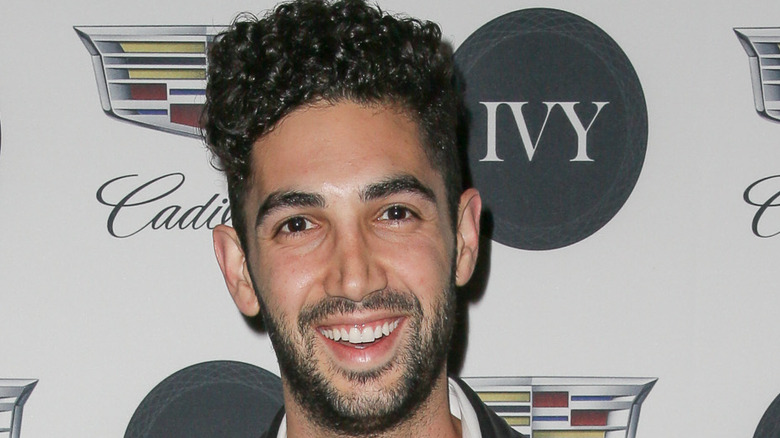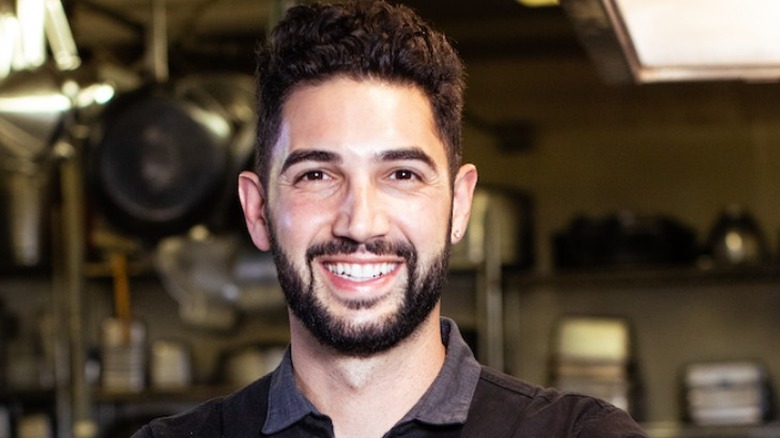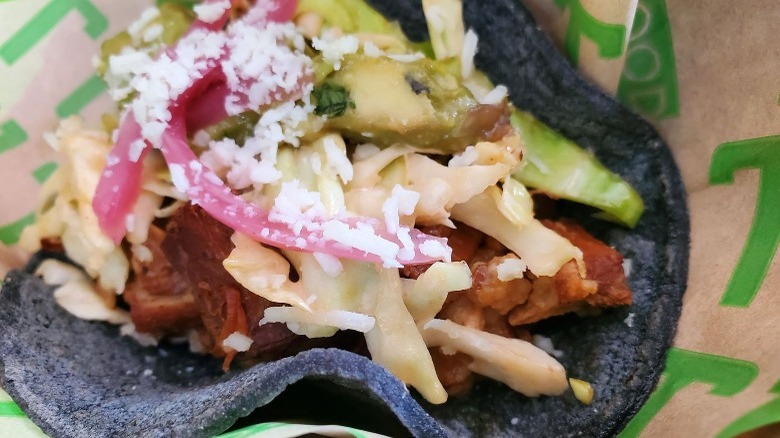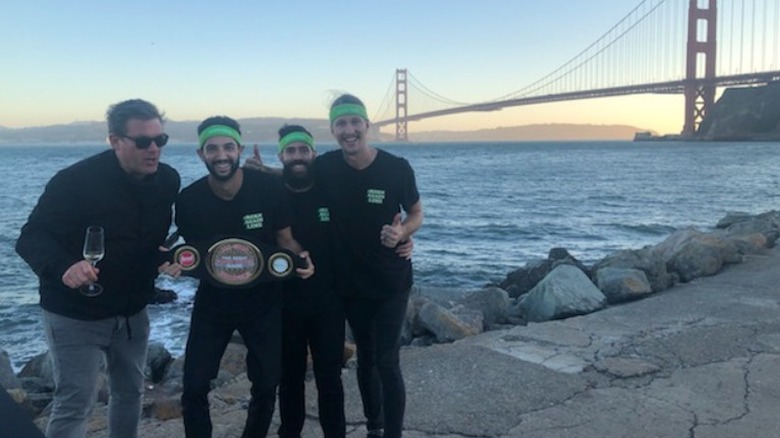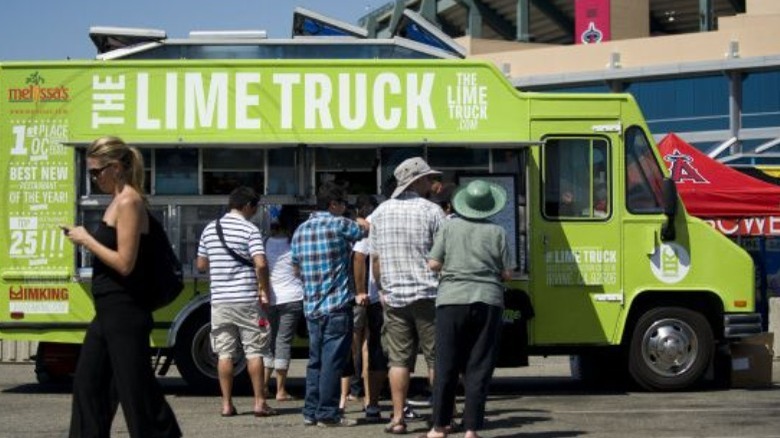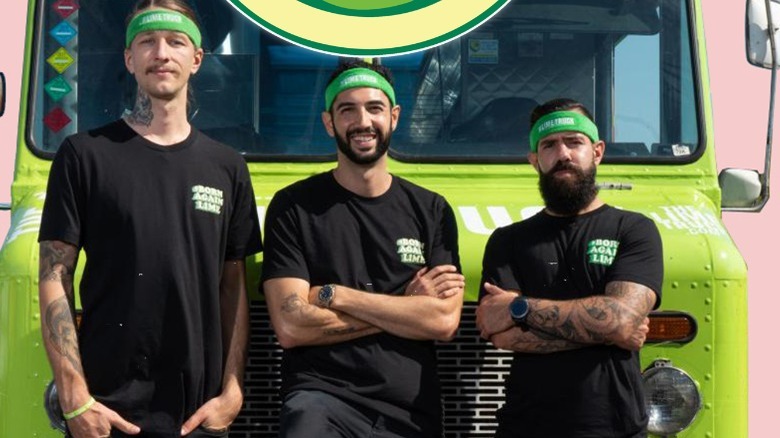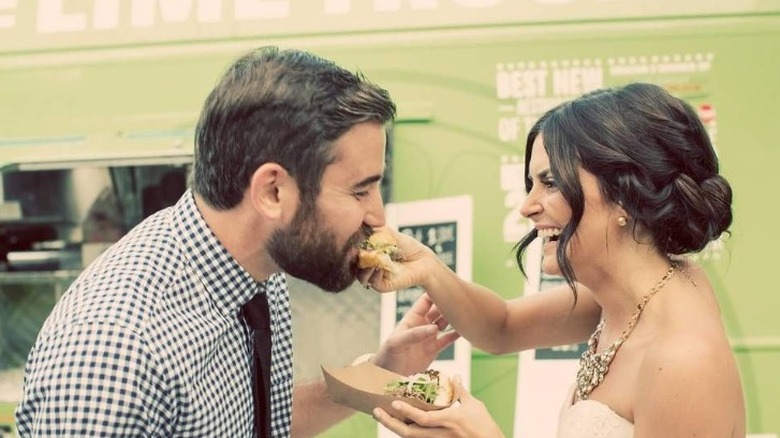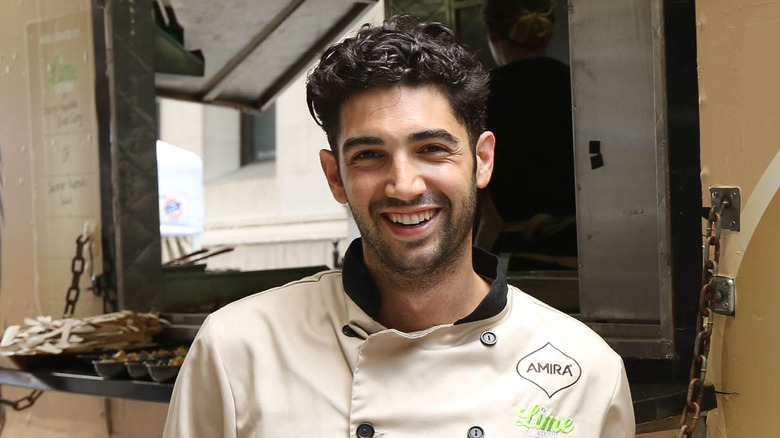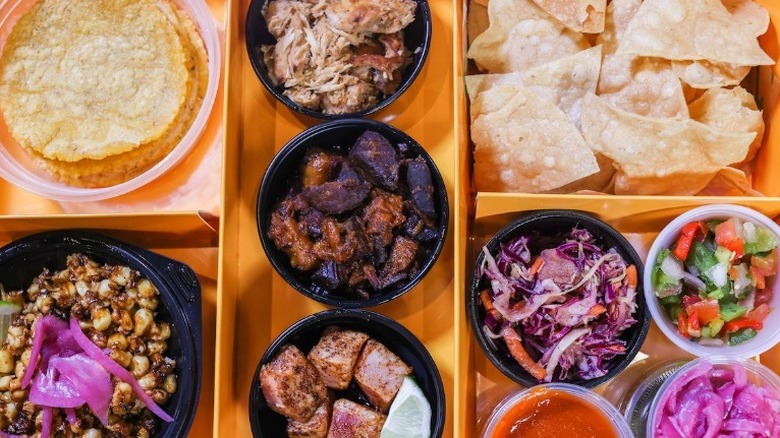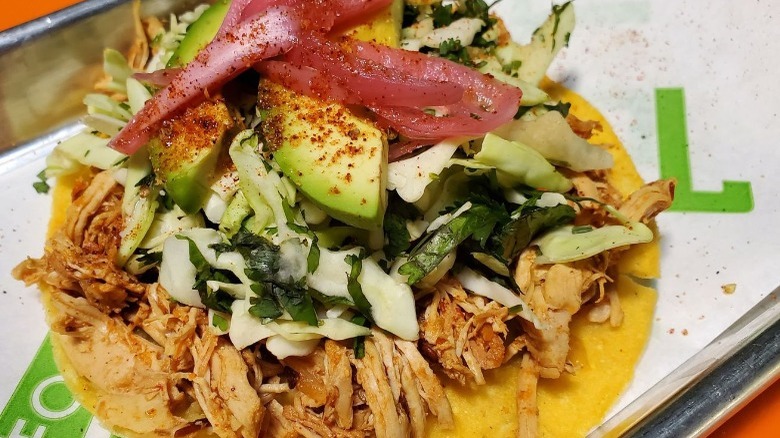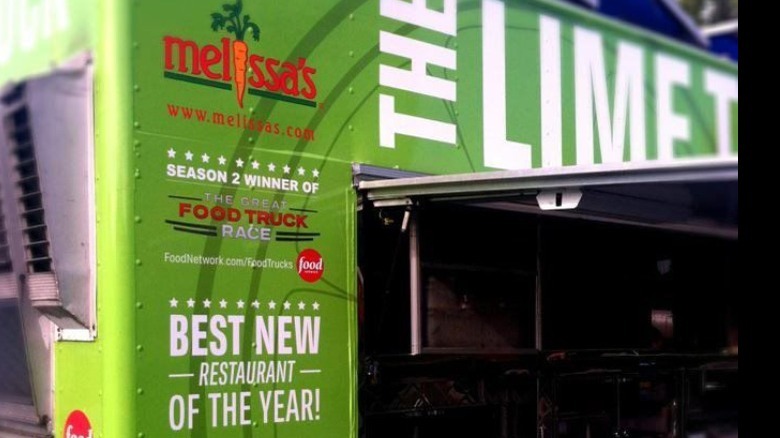Daniel Shemtob Talks The Great Food Truck Race & The Lime Food Truck - Exclusive Interview
If Daniel Shemtob hadn't founded a food truck at 20 years old, with a drive like his, he might have been Hollywood's next big name in fashion. (We're just speculating here, but more on that later.) Shemtob heads a growing food truck business and sat down with Mashed for an exclusive interview, along the way revealing that if there was anything he could go back and tell his self a decade ago, he'd advise adopting a better financial system. The young entrepreneur put $15,000 into Born From The Lime Truck when he started, and admits to losing "all my money a few times," before finding his footing. Even when he won season 2 of "The Great Food Truck Race," and started making $2 million in revenue, he had a hard time turning a profit. While he did hit a few bumps on the way, Shemtob — who is franchising his business — has clearly arrived.
Daniel Shemtob discusses the kind of TV show he'd like to create
After winning the "Great Food Truck Race" the first time you said something like, "I was expecting Bobby Flay to call me up and offer me a show." Obviously, that didn't happen. Are you still waiting on the call? And if so, what kind of show do you want to do?
I'm always waiting on the call, I love Bobby. For me, I think the things that I get the most joy out of in life is travel and food. So if I got to merge those two experiences and be able to come up with a cool storyline behind it. Very Anthony Bourdain vibes, but maybe a younger generation of that. Because I don't think anyone could replace him. Something like that would be incredible — but no. No calls. I got to do a lot of TV. I got a good agent. I got to do a lot of little fun things, but to get my own show didn't happen yet.
So, a travel show. Where are the top three places, you'd go?
So, if it's places I've been and I think it would be incredible, it would definitely be Hong Kong, Mexico City, and Singapore. And that's because I had a restaurant in Singapore, I got pretty involved in the restaurant scene there. And then Mexico city is incredible and I think there's a good scope. And then Hong Kong, it's the mecca. There's so much variation there, it's so good.
Daniel Shemtob's food truck origin story might surprise you
What was your light bulb moment? Why start a food truck and not something else?
Why I chose food trucks was I had a real estate services company, and I hated going to work. And so it was really obvious that passion was a big part of my ambition. They were one and the same. If I wasn't passionate my ambition goes away. The concept of knowing that really woke me up and then I was like, "Okay." I was only 20. And I was like, "What do I love?" At the time I only loved food and fashion. That was it. And fashion felt very far away from me.
I had a mentor when I was thinking about doing fashion when I was 17, because I worked in fashion until I was 18. And he basically told me not to do it. I don't know if it was the right advice at the time or whatever, but it definitely skewed me away from it. Then, I thought about food and at the time, the idea of opening a restaurant didn't seem even feasible. I was like, 'Oh, it's so expensive. And I don't know anything about it.' A food truck seemed really doable and they were just coming on the scene. And then I went to go talk to the owner of Kogi, which is Roy [Roy Choi]. And I go to Roy, we meet at this food truck line in Irvine. There's 40 people in line. And everyone's talking to him and I'm like, 'Hey man, I'm thinking about starting a truck.' He was like, "Oh, f**** yeah. You got to start a truck. Oh my God, you got to do it. Like, whoa, whoa."
I was like, "Wow, I've got to do it... so awesome." That was it. He was the final push, just having this guy so excited about it who owned another truck. And that's what's so cool about the food truck community, is they're very supportive of each other.
Daniel Shemtob talks about what it was like to watch the edited show
You flew back from a detoxification vacation to watch the season finale with your crew. What was it like for you watching that win?
So I flew back from Colorado to watch the finale with my teammates and then Waffle Love from Utah came, which was really cool. It was emotional. My mom was in it and my mom passed away shortly after that filming. To have her on the show was probably the coolest thing out of the whole show for me to watch and see. It's like this amazing ... I'll always be able to reference that point, which I thought was really cool. It's nerve-wracking, too. You don't know how you're going to be presented. Of course, you want to make good TV. They're going to make it look as close as possible. So he had these insane lines, which they didn't show on camera and stuff like that...
But what they didn't talk about was, in the second to last episode, we had a 14 or 15 item menu and we charged $200 for it. That was a little bit different than Seoul Sausage's strategy of charging $30 and doing three items. So, they were more expensive per item, but we had a lot more items. In the last episode, they wanted us to price match. Because they said it was too much of a variance between the two teams. So we did and still beat them by a lot... It was cool to watch how that didn't get presented, even though it was a big change for us. We changed our whole strategy, the whole show. And so it's just interesting to see like how production finishes it.
You've said you changed your entire strategy. How did that affect you going into it?
Literally, the night before we had to change our strategy. Like the night before! And we're a very organized team. The reason why I think we're so successful on that show is all of us come from backgrounds of doing large, large-scale events. Jessie manages three wedding venues. That's the hardest job in the world. I have four catering companies. Literally, all we're doing is menu planning and strategizing — and Marco the same thing. That's our special sauce.
[And] the night before at nine o'clock like, you say, "Hey, you guys have to change your pricing strategy." ... And honestly, I think it might've helped us a little bit in the last episode, because it was so busy that if we had a 14-item menu, I think we would have been crushed. I think we did like six or seven, I think in the final. Versus 14, which is honestly a huge difference when you're talking about working in a line and creating that many dishes at the same time... But I think one thing about being a food truck operator is that if you're not quickly willing to adapt and be flexible in these moments you're going to fail... What we did is we took the information and we just said, "Okay guys, this is what we need to do. This is what production wants. So, let's make it work."
What it was like to film "The Great Food Truck Race: All-Stars" during COVID
Can you share any other behind-the-scenes things that you wish people were seeing on ["The Great Food Truck Race"]?
I think any show, it doesn't matter if it's "Great Food Truck Race" or anything, and it's the BTS is ... You want the competition be down to the wire. Because if one truck just comes through and blows away the other trucks, it's not going to be fun to watch. Seoul Sausage is a fierce competitor. At no point did we think, "Oh, we got this ..." I literally think we all put in 110% to get to that finish line and they did too.
During the COVID, we had, I want to say a 70-person line and a guy came and just started deejaying for the line, which you can't show obviously on television because the music rights and it'll be a total sh** show. But it was so fun to see the last day — In San Francisco where it's a ghost town to get 70, 80 people in line. People were dressed up, they were dancing ... It was on a Friday or Thursday. It was a weekday, and it was probably the coolest vibe I saw.
I think going into the pandemic, we lost a lot of what it feels like to serve hospitality out of our businesses. Because if you come to my restaurant, especially during the pandemic, there's nobody in the restaurant, they're all outside. I'm serving people, but I'm not really seeing the reaction. I'm not getting energy, the give and take of energy of hospitality. Food truck, same thing. People are really scared, they don't want to go to the truck. They want everything packaged away. And so it was such a beaming, exciting, peak of the whole show, having a chance to actually do the hospitality the way you love it. And forgetting that we were in that pandemic for a few moments. Looking back now, it feels like it's sped up. But at the time it was one of the most exciting, relieving, fun things.
Daniel Shemtob dishes on why prepping for "The Great Food Truck Race" was surprisingly challenging
You talked about the fact that "All-Stars" is completely different because everybody comes ready to play. What's your mentality going in it, 10 years after your first win? Were you more prepared?
It's two-fold. I have five different businesses ... if I didn't have the five other businesses, I would probably prep a lot for the show. But for me, all my prep was pretty much getting the businesses to not need me for the five weeks that I would be gone because ... of course, you want to have confidence. I assumed I'd definitely be in the final two, if not final three or whatever. So, I knew I'd be there for most of the time. I had to be able to get the businesses to a point where they didn't need me, because I am the operator, I run a lot of things. And I knew if I could get myself to be free and not feel Iike I'm indebted to the business, or I need to help them, I can focus on the show while I'm there.
And by the way, this is the nature of reality TV. I think the pandemic had a lot to do with it. But the first time we went, they were like, "You're going to be on the show," four months prior. And we're like, "Oh, okay, cool, great." And then, three months prior, "Where's our contract?" Two months prior, "Where's our contract?" One month prior, "Where's our contract?" Two weeks prior, "Where's our contract?" Four days prior, "Here's your signed contract, you're on the show." In four days we had to do everything.
I was like, 'Wow, this is really sh***y." Like I can't believe they would only give us four days. We had to scramble to get a new truck. This time around, I was like, "Oh, it's the "All-Stars," they know they're dealing with a higher class of people. ... We're going to have more experience." And I think, honestly, again, I think it's mostly because of the pandemic. But I don't think we knew we were going on the show until five days, three days prior. The producer was like, "Listen, you're going, but there is a chance you won't go because if we don't get the permits ..."Because they don't want 50 people together as a crew in a city right now. It's high risk. And so, because of the last-minute nature of the show too, that was in itself, so challenging.
It took a lot of the prep away. I think when we got there outside of maybe three or four hours of discussions of what makes the most sense menu-wise, knowing the show's format. And then I watched season 12 and season 9 before just to get two different seasons to understand what the show is like again, because it's been so long since we've done it.
Daniel Shemtob refused to eat his own food during "The Great Food Truck Race"
You've talked about how stressful the experience was for you and how it took a toll on your eating habits, what was that like for you?
So the production company only pays for one meal, but that's not the hindrance of me eating. But the production company only pays for one meal, which is Starbucks in the morning. It's a Starbucks breakfast sandwich and it's a coffee. I think eating anything 30 days in a row is going to [make you] feel sick ... but eating a sandwich that's not fresh. Whatever system Starbucks uses, it does not do well for your system.
If you want to eat on your truck, which is what everyone would assume you would do — think about that trucks go home for five bucks. Imagine you ate one taco and that's the reason you're going home. You can't do it ... I'm not going to do it. So, what ends up happening? Also, because it's competition mode, you're working... Honestly, I won't take a break and I don't think anyone did. You'd work a 12-hour day and you wouldn't take one second off because it's again, $5 between the first and second place team going home.
At home, I cook all my own meals I eat really healthy. If I don't eat healthy, I'm still the one making it. I know exactly what's going on with the dish. The idea of going to store-bought food or Starbucks sandwiches, or then finishing work at 11 o'clock and getting our truck back and then eating at midnight. And that's not good for your system. It went to absolute crap and I'm very much a believer of mental health from food. Taking it out [of] your hands, not cooking your own food is already a huge problem. Then going to processed, fast food because that's all that's open is like the worst possible thing. And then, eating at those hours, it was not good.
Daniel Shemtob discusses what it takes to win "The Great Food Truck Race"
What are the top three things it takes to win a food competition?
Top three is tough ... I think teamwork and collaboration is probably the biggest one. I don't think by any chance would I have won, if I didn't have good teammates. Zero chance ... And then how you work together, how you collaborate. Jason who was on the show with us last time, who's an extremely talented chef, maximum talent. We don't work that well together. We used to be business partners. We used to be friends. We're still friends, but we stopped [being] business partners and it's because I think we have challenges in aligning. That in itself can create so many ripples while you're on the show. This time we didn't have him. And I don't want to say it was smoother or less smooth or whatever.
But the overall feeling was we were so in sync with each other the whole time that you couldn't break our team up. If you walked onto our truck, even from the first episode. It was the best production line that it would take ... One of the challenges in episode three, was I got to go onto Seoul Sausage's, truck. There's s*** everywhere. It's a mess. It's disorganized. They don't know who's in charge of what. The ticket system doesn't work. And I was like, "Oh, I forgot what it's like when you're with new people." It doesn't matter how good you are. If you're with new people, you don't really vibe. And so, luckily that teamwork, that collaboration was incredible.
Another one is your network. It is what it is. Your network is a big part of your ability to win in these cities. I'm not from San Francisco. I only have a few friends there. I have no family there. That was a big challenge for me ... dipping into networks that already exist to be able to grow. That's a huge one. And that was a disadvantage for us, I think in that city.
The last one is menu development. Because you're given $300 to $400 of seed money, and you have to stretch that and you have to be able to stretch that at a market that's like Whole Foods, ultra premium, it's called Gustus, it's an incredible market, but it's very expensive. To figure out a menu that works there is insane. There would be nights where I go to bed and I'm like Rain Man. I'm like, "$1.98 Cannellini beans ... $1.67 salmon belly." And then if you can plan that altogether and hit on the other two, you have it pretty good.
The unexpected ingredient that Daniel Shemtob loves the most
You're a big proponent of lime in your food. Can you tell me what other ingredients are "must-haves" in your food truck and restaurants?
I think one of the things that I love absolutely the most, is I really love tomatillos. [They're ] part of the gooseberry family. They have a nice punch, great texture, a little bit of tang and acid and sweetness, which just creates really great types of dishes. I love that for our salsa, for our pico de gallo. I love sambal ... That's my thing. I love it more than anything. Then, garlic chili paste. Oh, and zest. Whether it's lime zest, lemon zest, whatever. I love zest. Well, kosher salt, but I also like to balance sweet, salty, and acid.
Those are my things. We [also] use a lot of pickles. Pickled miso radishes, pickled red onions, that stuff really does well. And then organic masa to make our own tortillas from scratch. That's huge. We didn't do that on the show, but we do that in our restaurants. And then I think my favorite thing at home that I can never live without is shallots, green onions. I like that family a lot. I don't do that much garlic, [it's] just a little hard on my stomach, but it tastes great.
You believe in "mental health through food." What does that look like for you? Can you give our readers a go-to simple recipe that you cook at home for yourself?
Everything's quick. For instance tonight ... I'm having shabu-shabu. But a normal Monday night, I go to the farmer's market on Sunday. I get fish, I get whatever produce I think is good. And then let's say, it was last Monday or whatever. What I would be doing is, I would just take the fish. I would make some kind of sauce for it, which typically is dijon, olive oil, lemon zest, garlic, whatever. I would just baste the fish in the oven at 375, and at the same time, I would cut up mushrooms, squash, asparagus, whatever that I know will cook around 12 to 15 minutes, which is the same as the fish. And I just put it all in the oven and go back to work ... and then for lunch, I always do a chop salad or leftovers depending on what I made the day before.
Why Daniel Shemtob is franchising his food truck
Your food truck and restaurants are coming hopefully to a city near everyone soon. What is the one menu item that everyone should try?
It depends if you eat meat or not. If you eat meat, the Vegas taco with short rib. It's a taco I put on the menu eight years ago and it's just magical. It's a six-hour slow braise red wine, short rib. It's got horseradish crema and then arugula [and] buttermilk fried onions. When you get the combination of [it] all, it's pungent, it's bright, it's rich. It's got umami, it's got great texture. It's a gringo style taco, but it's just so good.
And then our ponzu-marinated shiitake mushrooms, I go crazy about it. We marinate them exactly for four and a half hours and then we wash them. If you do four hours, not strong enough, you do five hours, too strong. So, it's really important. We do that with furikake, which is a Japanese seasoning. Cilantro chimichurri and queso fresco. And it's like ... Oh my God, it's just magical. It's one of my favorite things I've ever had.
To get to where you are right now, you talked to a lot of well-established franchise owners. Can you let me in on some secrets?
It was at Sweetgreen, with John. I think the better I've gotten as an entrepreneur, the more vulnerable I am with telling great people that I'm there to learn. I reached out to [John] and I walked into his office and I said, "Listen, you've created this huge, amazing company ... What do you think is the best thing you bring to your company?" And his eyes lit up and he was like, "Look at this core values book." ... What he was already seeing is how important people are to your organization.
I started my business when it was easy to get employees, it was right after a recession. People wanted to work on the truck. The trucks were hot and I never really had a hard time getting employees. And because I'm so hands-on, the culture is exactly me. In the past few years, we started to expand. Employees are harder to get, especially right now, it's insane. Culture has played a bigger role than it's ever had, and having him to help guide that — it was just the right time. ... And then, I talked to the owner of Firehouse Subs before I started franchising and he taught me how to do my franchise business.
When I go into a room, just assume that ... that everybody in the room knows something about something more than I do. And so let me tap into that. I feel through mentorship, I've become a 10, 20 times better human on top of being an entrepreneur. That's really where the secret sauce is. And I think everybody's different, but for me, I learned a lot from doing and I learned a lot from being, and so that's really helpful. I didn't go to school. I didn't go to college. So, [my education's] much more practical.
Daniel Shetmob's Born From From the Lime Truck dream
What's the franchisee-selection process like?
I do want one in every city ... but in 10 years. So I think the thing is for me right now, I really took a hard look at why I wanted to do franchising over opening my own stores. And the idea is to work with entrepreneurs and create a really amazing entrepreneurial culture. And the idea of having an entrepreneur fail, it happens. I failed, everybody's failed, but I don't want to have it happen. I want them to be successful. And when they fail, they hurt the brand and they, unfortunately, hurt their own lives and typically their savings. There's a lot of damage that it can cause. My dream is that I get to make sure every franchisee is successful...
I'm really selective about who I pick ... I just have to be patient. It's crazy. I've had the brand for 11 years considering my age and just like my ADHD with everything that I do ... It was when I hit the 10-year mark. It was a real wake-up call like, "Oh, 10 years can go by"... What do you want your legacy to look like? What do you want to be for those next years?
And that's why at first I was like, "Franchise, let's sell as many as we can." Then I was like, "Wait, wait, wait. If I do that, most likely, a lot of them are going to fail." Or maybe they won't. I don't know. But, I think the odds of it failing are higher. So, let's go slow. I hired the most amazing person who has 40 years of experience. Because I figured, that's, what's going to counter me really well. And we're going to take our time. And our goal is to only sell two franchises in one year, which is pretty small. But if I find the right two and they're really successful, then next year we can go out for five. I'm just going to
do it the right way and slow. And if it picks up steam, I'll only do it if it feels like it's sustainable and ethical.
Is there any advice you'd give your 21-year-old self today?
Go with my heart. This is still my advice to myself that I have the hardest time with. I like to be really analytical in business because I feel like that's what gets people to a great place ... but almost every time that I avoid my heart, it comes back to hurt me, doesn't matter what it is ...
And so trusting my heart is a daily exercise. In fact, when I wanted to start franchising, there's somebody who's really successful in the food franchise industry ... He picks brands very sparingly ... he wanted to do it with me. And I know he's a very difficult person. I sat there and I was like, "I know I'm going to make a ton of money with this guy," which it's still important for me to make money, and I didn't do it.
I was like, "I don't want to work with somebody that I know I'm going to have trouble with later in my life, just because I'm going to make some more money. I want to enjoy the work that I'm doing. I want to feel like I'm doing it for purpose rather than that empty feeling of a pot of gold at the end of the rainbow." That's a big one.
Considering that Daniel Shemtob and his team captured the win on "The Great Food Truck Race All-Stars" July 11 finale, if you spot a Born From the Lime food truck in your city, you should definitely try a taco — or three.
